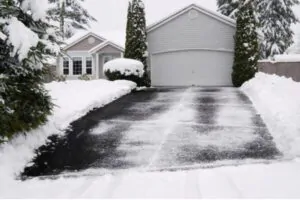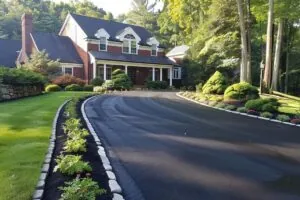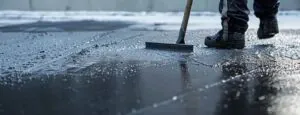Does your driveway suffer from the harsh onslaught of winter? It’s a well-known fact that brutal snowy conditions can cause serious damage to your driveway. This blog will highlight why you should seal your driveway this fall, offering protection against winter’s wrath. Curious? Keep reading to safeguard your investment!
Understanding Winter’s Toll on Your Driveway

Winter wreaks havoc on your driveway, causing damage from snow, ice, hail, rain, and freezing temperatures. The intrusion of water and the formation of cracks are the main culprits that deteriorate your driveway over time.
Unveiling the Harsh Winter Effects
Winter inflicts severe damage on your driveway. Cold temperatures cause the asphalt to contract, which can lead to cracks and splits. Additionally, snow and ice melt seep into these crevices, expanding when frozen and exacerbating the problem.
Furthermore, harsh chemicals from road salt also penetrate your driveway’s surface, causing discoloration or pitting over time. These damaging effects contribute to the accelerated deterioration of your pavement if not prevented properly during fall months with sealcoating protection.
Snow, Ice, Hail, Rain, and Freezing Temperatures: The Culprits
These culprits – snow, ice, hail, rain, and freezing temperatures – can cause significant damage to your driveway. The winter season is notorious for its challenging weather conditions that wreak havoc on all kinds of surfaces.
Your driveway isn’t immune to this onslaught. Snow piles up high on the surface causing pressure and tension which leads to cracks over time.
Ice has a similar destructive effect as well; it forms wedges in the smallest cracks and expands them into larger ones with every freeze-thaw cycle. Hail, being solid precipitation, causes visible pockmarks on asphalt driveways, reducing their lifespan considerably.
Incessant rain seeps through the pores in concrete driveways, while repeated episodes of freezing temperatures cause water trapped within these pores to expand, creating more room for further water intrusion, leading to deterioration from within.
The outcome is a compromised driveway rife with potholes and surface deformities – surely not something you’d want! Sealing your driveway before winter sets in helps combat these adverse effects, providing a protective layer against these cold-weather culprits.
Water Intrusion and Cracks: The Deterioration Process
Water slowly seeping into the tiny pores of your driveway can gradually become a menace. This unwelcome intrusion, often unnoticed, silently creates a destructive path for ice to form within the cracks and crevices during freezing winter temperatures.
Ice expansion is potentially damaging as it widens gaps and accelerates the deterioration process. Further complications arise when water evaporates from these cracks. The remaining void allows dirt and debris in, leading to an expansion of fissures on the driveway’s surface over time.
These accelerating factors result in significant damages that require costly repairs or total replacements if left unchecked for too long.
The Value of Preventative Actions
Sealcoating protects your driveway by preventing costly repairs and unsightly visual flaws, providing both protection and savings in the long run.
Repairs and Visual Flaws: The Costly Consequences
Neglecting repairs and visual flaws in your driveway can lead to costly consequences. Cracks, potholes, and other visible damage not only detract from the overall appearance of your property but can also pose a danger to vehicles and pedestrians.
When left unattended, these issues can worsen over time, requiring more extensive and expensive repairs in the future. By addressing these repairs in the fall when sealing your driveway, you can save money and ensure that your driveway remains in top condition throughout the harsh winter months.
Sealcoating as a Shield: Protection and Savings
Sealcoating acts as a shield for your driveway, providing protection and saving you money in the long run. By applying a sealant to your driveway, you create a barrier that protects it from harsh weather elements like snow, ice, hail, rain, and freezing temperatures.
This prevents water intrusion and cracks from forming, which can lead to costly repairs and visual flaws. Seal coating not only safeguards your driveway but also helps extend its lifespan while saving you money on potential repairs down the line.
Related Post: Cost to Sealcoat a Driveway: A Comprehensive Guide
Sealcoating Wisdom for Fall
Sealcoating your driveway in the fall offers several advantages that make it the ideal time for this important maintenance task. The moderate climate of fall provides balanced temperatures, which are crucial for effective sealing.
When the temperature is just right, the sealant can cure properly and provide optimal protection against harsh winter conditions. Fall also brings drier weather, allowing for better adhesion and longer-lasting results.

Choosing the right sealer is another key consideration when sealcoating your driveway in the fall. Different driveways require different types of sealers to achieve maximum durability and longevity. It’s important to match the sealer to your specific driveway type to ensure proper adhesion and protection against cracking, fading, and other forms of deterioration. Additionally, quality sealers offer a range of features and benefits that enhance their performance.
From UV resistance to increased traction, selecting a high-quality sealer tailored to your needs will help prolong the life of your driveway even further.
Balanced Temperatures for Effective Sealing
Take advantage of fall’s moderate climate, which provides the perfect balance of temperatures for effective driveway sealing. Want to know more about why fall is the best time? Keep reading!
Moderate Climate: Fall’s Prime Advantage
Fall’s moderate climate offers a prime advantage when it comes to sealing your driveway. The balanced temperatures during this season provide optimal conditions for effective sealing.
With consistent weather, you can achieve the best results for protecting and preserving your driveway. By taking advantage of fall’s moderate climate, you can ensure that the seal coating process is successful in providing a shield against winter’s harsh elements.
Consistency for Optimal Results: The Temperature Factor
Fall offers a prime advantage when it comes to sealing your driveway – consistent temperatures. The moderate climate of fall provides the ideal conditions for the sealcoating process to be most effective.
When temperatures are consistent, the sealer can properly cure and bond with your driveway surface, ensuring optimal protection against winter’s harsh elements. By taking advantage of fall’s temperature factor, you can achieve long-lasting results and maximize the durability of your driveway.
Ideal Weather Conditions for Sealing

Fall provides the perfect weather conditions for sealing your driveway, ensuring optimum results and longer-lasting protection. Don’t miss out on this essential information that will save you time, money, and hassle in the long run.
Moisture’s Impact: Hindrances Due to Weather
Fall is the ideal time to seal your driveway because of the impact moisture can have on the sealing process. When it comes to sealing, weather conditions play a crucial role. Moisture, such as rain or even morning dew, can hinder the effectiveness of seal coating.
It’s important to wait for dry spells in order to maximize the success of your sealing project. By choosing fall as the time to seal your driveway, you can take advantage of drier weather and ensure optimal results that will protect and extend the life of your driveway.
Embracing Fall’s Dry Spells: Maximizing Sealing Success
Fall’s dry spells provide the ideal opportunity to maximize the success of sealing your driveway. With the moisture from summer rains beginning to subside and winter precipitation still a ways off, fall offers a window of time when you can apply seal coating without worrying about it being compromised by rain or snow.
This means that the sealer has a better chance to properly cure and adhere to your driveway surface, creating a strong and durable barrier against future damage. Taking advantage of these dry spells in fall ensures that your sealing efforts will yield optimal results, protecting your driveway throughout the harsh winter months ahead.
Similar Post: When is the Best Time to Seal Your Driveway?
Exploring Quality Sealers
Quality sealers play a crucial role in protecting your driveway during the fall season. It is important to choose the right sealer that matches your specific driveway type. Whether you have an asphalt or concrete driveway, there are sealers available that cater to your needs.

These sealers not only enhance the durability of your driveway but also provide added benefits such as resistance against oil spills, UV damage, and harsh weather conditions. By exploring different types of quality sealers tailored to your needs, you can ensure long-lasting protection for your driveway throughout the fall and beyond.
Choosing the Right Sealer: Match to Your Driveway Type
To choose the right sealer for your driveway, consider the following factors:
● Driveway Material: Determine if your driveway is made of concrete or asphalt. Different sealers are designed specifically for each material.
● Surface Condition: Assess the current condition of your driveway’s surface. Is it smooth or rough? Are there any visible cracks or damage? This will help determine if you need a sealer with additional filling and repair properties.
● Climate: Consider the climate in your area. If you live in an area with extreme temperature fluctuations or harsh winters, you may want to opt for a sealer that offers enhanced protection against freeze-thaw cycles.
● Longevity: Think about how long you want the sealer to last. Some sealers provide short-term protection and require more frequent reapplication, while others offer longer-lasting results.
● Gloss Level: Decide on the desired finish of your driveway. Some sealers leave a glossy appearance, while others offer a more natural matte finish.
Conclusion
Sealing your driveway in the fall offers a range of advantages. The moderate climate provides ideal temperatures for effective sealing, ensuring optimal results.
If you need seal-coating services for your driveway, the experts at Donovan Sealcoating is here for you! Our high-quality sealcoat products and years of experience in the sealcoating industry make us the best people to call for sealcoating services. Don’t hesitate to call us when you need us! We’ll be there to help.




